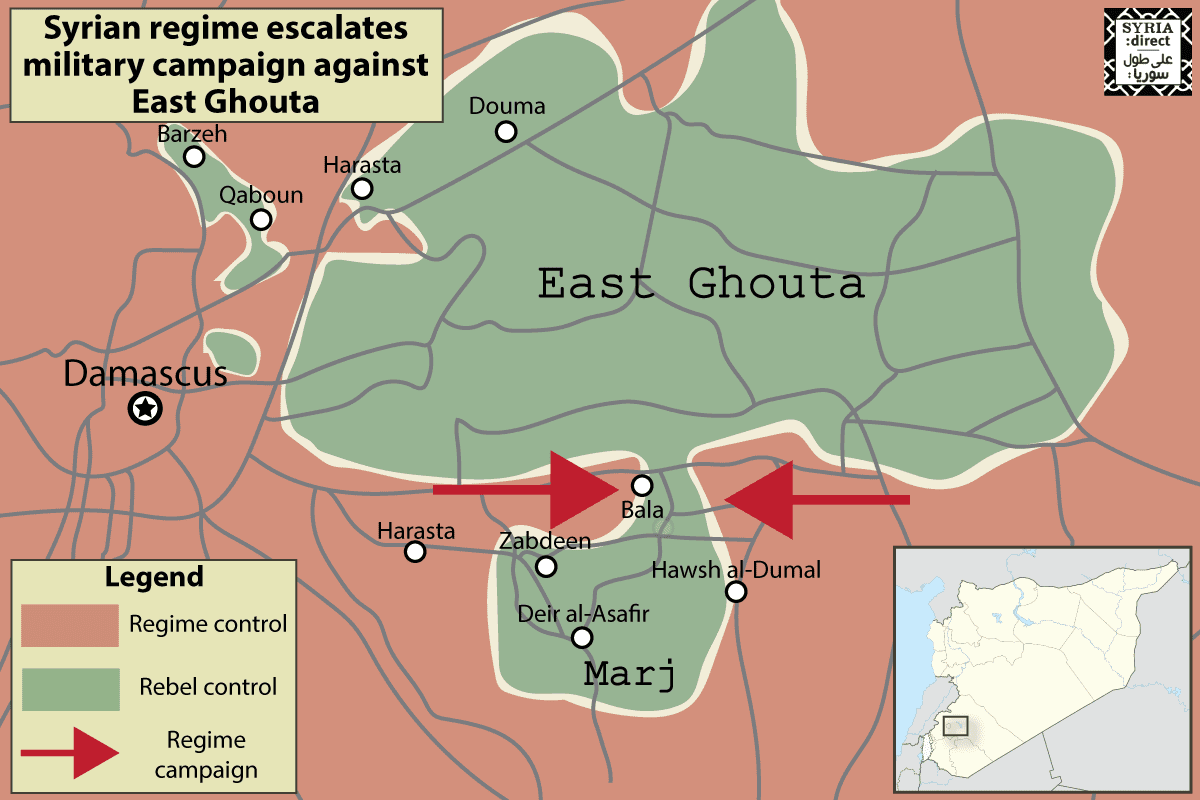East Ghouta a war zone despite truce: ‘Warplanes began flying this morning’
AMMAN: The Syrian regime escalated its military campaign against East […]
31 March 2016
AMMAN: The Syrian regime escalated its military campaign against East Ghouta this week, conducting airstrikes against civilian targets as it attempts to break into the encircled, rebel-held suburbs of Damascus, local military and medical personnel told Syria Direct Thursday.
Warplanes struck a hospital, school and two Civil Defense buildings in the town of Deir al-Asafir, roughly 10km southeast of central Damascus, killing 32 civilians, Mahmoud Adam, spokesman for the Civil Defense in East Ghouta, told Syria Direct.
“The warplanes began flying overhead early this morning—a series of air strikes on the towns in the Damascus countryside followed, with the biggest crime committed against the residents of Deir al-Asafir,” Adam said on Thursday.
On Wednesday, the Syrian army and its allies tried unsuccessfully to storm the rebel-held city of Douma, the headquarters of Islamist brigade Jaish al-Islam located in northern East Ghouta.
“The regime tried to sneak into [Douma] from the direction of the Damascus highway, but rebels drove back their attempt,” Hamza al-Beiraqdar, spokesman for Jaish al-Islam, told Syria Direct Thursday.
Regime artillery then struck the area in a bid to aid advancing forces—“but that failed again, and we were able to kill more than five regime soldiers,” said al-Beiraqdar.
Regime warplanes also bombed the city of Douma on Wednesday, hitting a mosque in the city, reported pro-opposition satellite station Al-Aan.
State media did not comment about the recent fighting in Douma.
Meanwhile, the Syrian army and its allies are continuing a campaign in southern East Ghouta to break up contiguous areas of rebel control, specifically in the Marj region, in order to drive a wedge between Ghouta’s north and south. Two days after the internationally brokered cessation of hostilities went into effect on February 27, regime forces took new territory in the Marj region and have tried to gain additional ground since.
Pro-regime media outlets reported on Wednesday that the Syrian Arab Army cut off the last supply route leading from northern East Ghouta to villages in al-Marj, where they claim Jabhat a-Nusra has a presence. But a war photographer from inside Marj, who preferred anonymity, told Syria Direct Thursday that “the road is still passable, but with difficulty.”
Marj is a cluster of 28 villages and contains fertile agricultural land. It serves as “the agricultural storehouse for East Ghouta, with huge agricultural plots and fruit-bearing trees…that have helped ease the siege” on East Ghouta, Abu Suleiman, member of the Outer Damascus Provincial Council, which organizes civilian life and municipal services in the rebel-held area, told Syria Direct earlier this month.
A regime takeover of the breadbasket of East Ghouta—encircled for nearly four years—will squeeze civilians even harder, a rebel fighter in Marj told Syria Direct at the start of the regime’s latest campaign.
The two main brigades in East Ghouta, Feilaq a-Rahman and Jaish al-Islam, are signatories to the international cessation of hostilities agreement, and say they are adhering to it because they are seeking to hold the territory already in their possession, while the regime is violating it by conducting offensive operations.
“All of the brigades operational in Marj are part of either Jaish al-Islam or Feilaq a-Rahman,” said provincial council member Abu Suleiman. Neither Jabhat a-Nusra nor the Islamic State, who Abu Suleiman says have no presence in Marj, are included under the international ceasefire agreement.
“The nationwide cessation of hostilities is to apply to any party currently engaged in military or paramilitary hostilities against any other parties other than ‘Daesh’, ‘Jabhat a-Nusra’, or other terrorist organizations designated by the UN Security Council,” reads the ceasefire announcement.
One rebel spokesman sees that the regime’s latest attempts to progress in East Ghouta are connected with international negotiations starting in Geneva to find a political solution to the five-year old Syrian civil war.
“The international community is heading faster and faster towards a solution to the conflict,” said Wael Alwan, spokesman for Feilaq a-Rahman, one of the largest rebel groups in East Ghouta.
“Therefore the regime is trying, before the upcoming negotiations, to increase its area of control.”








